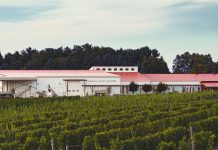
While Creighton Gallagher comes from a long line of Gallagher family fruit farmers, he and his wife, McKenzie, are the first Gallaghers to grow grapes.
They’re now celebrating five years in the wine business as owners of Rove Estate Vineyard & Winery near Traverse City. It’s been a whirlwind of raising four children, keeping their cherry farm operating and launching a winery — not to mention a brush with cancer thrown in for good measure.
The couple live on a farm that is about a mile from their winery. They bought the place from Creighton’s dad in 2011 and are the third generation to own it.
“We were just starting our lives and Creighton was working at a winery on the Old Mission Peninsula,” McKenzie recalls. “He was like, ‘This is what I want to do.’
“I was like, ‘That sounds great — I like wine, you’re the farmer.’ It was all very innocent, when we look back, how bold we were without knowing it.”
In the early years on the farm, some old orchards had to be pulled, and so the Gallaghers replaced them with grapevines.
“That was our intention — that was our dream — to open a winery,” she says.
From the Ground Up
They planted 15 acres of grapes the first year: Pinot Noir, Cabernet Franc, Merlot, Chardonnay, Riesling, Pinot Gris, Sauvignon Blanc, Pinot Blanc and Gewürztraminer. They’ve added more since, including another five acres this week. They also farm 35 acres of cherries.

“We really wanted to try a little bit of everything to see what would do well,” McKenzie says. “And really, everything did.”
They divided responsibilities along “indoor” and “outdoor” lines: Creighton is outside primarily managing the farm and McKenzie is more involved in operations, marketing and public relations.
Rove produced its first vintage in 2014 and opened in the spring of 2016. It wasn’t the best time — a polar vortex wiped out a good part of the crop that first year — but they stuck with their opening timeline and had to source other local grapes for their 2015 vintage.
They did it all from scratch, building a tasting room overlooking the vineyards. It’s on the highest point of the Leelanau Peninsula, McKenzie notes.
Until now, the actual winemaking has taken place offsite. That’s about to change as they make plans for a new 15,000-square-foot production facility that will be built near the tasting room.
“I call it a measured approach,” McKenzie says. “Being young, we didn’t have the capital (to build a production facility at first), and wineries are extremely expensive to build. First, we focused on our vineyards, then our tasting room to sell the wine and now we’re focusing on the production facility.
“Our goal for next year is for all of our production to be right at Rove.”
And they’ve just hired a new winemaker: Doug Olson, who recently moved to the Traverse City region with his wife, Jacqueline. He just graduated with his Master of Science in viticulture and enology from both Bordeaux Sciences Agro and the Institut des Sciences de la Vigne et du Vin, one of the leading wine research centers in France.
Overcoming Obstacles
The Gallaghers’ journey hasn’t been without challenges. There was the polar vortex. The pandemic created a new set of obstacles, though it also had a silver lining in that it resulted in higher enrollment in their wine club.

“That is such a testament to the product and people believing in our farm,” McKenzie says. “I think I see a trend … of people really being more mindful in supporting farming.”
When McKenzie was diagnosed with a rare breast cancer a year after the winery opened, the timing couldn’t have been worse — not that there is ever a good time for that.
“It was really hard,” she recalls. “My (children were) 2, 4, 6 and 9 when I was diagnosed, and we had this brand-new baby business and a farm.
“That was 2018. That was definitely the year it all just came crashing together.”
With support from family and the “strong team” they’ve built at Rove, and a whole bunch of other caring people, they managed to get through.
“I’ve been in remission now for two years and feel healthier than ever,” she says. “But I do think (that) that chapter of our life was so hard is probably why we’re so grateful and intentional now.
“It gave us so much clarity and empowered us to keep going.”
Now she looks back on their first five years and sums it up in one word: “fantastic.”
“Before we opened, I actually had a corporate job, and that was way harder because it was really segmented and compartmentalized,” she says. “We were still cherry farming before we opened Rove, and being a mom, there was a lot of juggling.
“Now, the beauty of this lifestyle is it’s all together. Our children are involved, there’s such an appreciation for the season we are in, and what comes with that season. It’s so gratifying to have an opportunity to work so hard and see it come to fruition.”












Facebook Comments